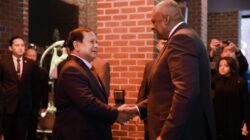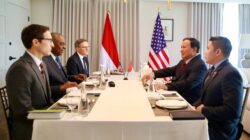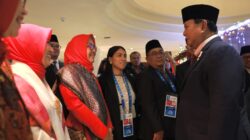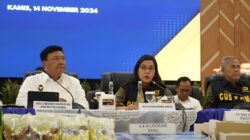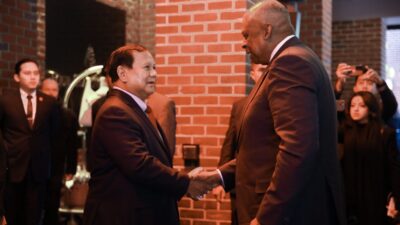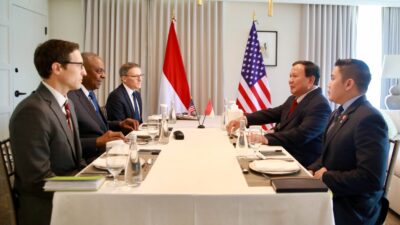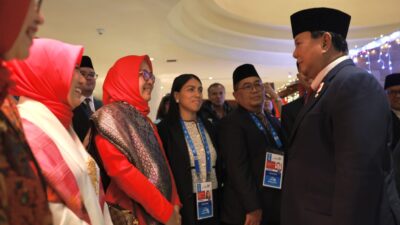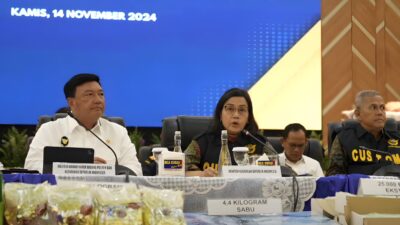By: Prabowo Subianto [excerpted from “Nation’s Transformation Strategy: Toward a Golden Indonesia 2045”, pages 120-124, 4th softcover edition]
I’m of the opinion that a nation’s economic issues aren’t too dissimilar from managing oneself, a household, or a business.
Imagine working without knowing where your savings are? You’d be powerless, right? Suppose you’re paid monthly, but a portion of your salary is inaccessible for savings. Then, you’re quite limited in what you can do.
Article 33 of the 1945 Constitution was crafted by our nation’s founders to ensure our country has sufficient savings for development.
As long as we disregard Article 33 of the 1945 Constitution, our wealth will continue to flow overseas. Our currency will remain weak, and our economy will be at the mercy of other nations.
This needs to change; this must be corrected. “The land, the waters, and the natural wealth contained therein shall be controlled by the state and exploited to the greatest benefit of the people.” This is a mandate of the 1945 Constitution.
Yet, many Indonesian elites pretend not to see this. There are also intellectuals in Indonesia who feign ignorance of the 1945 Constitution. They claim Article 33 is outdated, irrelevant, and insignificant. Some argue, “what matters now is free competition, the free market, globalization”. Leave everything to the market. A few wealthy individuals will trickle down their wealth. The trickle-down effect.
True, there might be trickles, but pardon me, perhaps we’d all be dead before it ever reaches the bottom.
Moreover, whenever I discuss Article 33 of the 1945 Constitution, I’m often mocked. Some even say, “Prabowo is dangerous. He will nationalize everything. He will seize the rich’s properties.”
That’s a misunderstanding. My goal is to expand our economy and ensure a fairer distribution of wealth. It’s not right for just 1% to have control over everything, nor for foreign entities to hold all the power. While the strong may forge ahead, it’s the government’s duty to support those who are less strong.
My principle is live and let live. Not live for yourself. Not a zero-sum game. Not I win, you lose.
My principle is, I win, you win. We win. A win-win situation is what I want, and that’s the essence of Article 33, Paragraphs 1 to 3 of the 1945 Constitution.
Article 33 is very clear. Paragraph 1 states, “The economy shall be organized as a collective endeavor based upon the principles of the family system.”
This is foundational. We can’t hold the belief that the strong get stronger at the expense of the weak. Such an opinion is not in line with Pancasila or the vision of our nation’s founders.
According to Paragraph 1, those who are economically strong should help the weak. The government should lead, not just referee. It should protect the nation’s wealth. If the populace remains impoverished, the government has a responsibility to improve their situation. This is a directive of the 1945 Constitution.
Paragraph 2 states, “Sectors of production which are important to the state and which affect the life of the people shall be controlled by the state.” This is a constitutional command of the Republic of Indonesia.
Paragraph 3, “The land, the waters, and the natural resources contained therein shall be controlled by the state and exploited for the greatest prosperity of the people.” This isn’t just what Prabowo wants; it’s a mandate of our Constitution.
Currently, many Indonesian elites have abandoned the values of the 1945 Constitution and Pancasila.
Pancasila is often mentioned, but not practiced. This is enabled by the amendments to the 1945 Constitution, which added Paragraphs 4 and 5 to Article 33. Paragraph 4, “The national economy shall be conducted based on economic democracy,” essentially clashes with Paragraphs 1 to 3, leading Indonesia’s economy toward a free-market ideology.
That’s why I believe, if we truly want to strive towards a prosperous country, we need to identify and address the root cause of our economic issues, which lies in the alteration and half-hearted enforcement of Article 33.
To address this issue, we need to revert our constitution back to its original state, the version from August 18, 1945. By doing so, the Indonesian economy will be in the hands of its people, and the government will accumulate savings for development purposes.
This way, our current leaders and political figures can move beyond mere dreaming. They won’t have to be ‘warriors of what will be,’ talking big about future plans but achieving little due to financial constraints. With adequate resources, they’d be capable of accomplishing much more for Indonesia.
Original Text, August 18, 1945
(1) The economy shall be structured as a joint enterprise by virtue of the principles of kinship (asas kekeluargaan).
(2) Production sectors important for the state and vital for the livelihood of the people at large shall be controlled by the state.
(3) The land and waters and the natural wealth contained in it shall be controlled by the state and utilized for the optimal welfare of the people.
Additions from the Amendment on August 11, 2002
(4) The national economy shall be conducted by virtue of economic democracy under the principles of togetherness, efficiency with justice, sustainability, environment insight, autonomy, as well as by safeguarding the balance of progress and national economic unity.
(5) Further provisions regarding the execution of this article shall be regulated by laws.

![The Foundation of Advanced Indonesia: Pancasila Economy [Original 1945 Constitution Text]](https://i0.wp.com/prabowosubianto.com/wp-content/uploads/2024/04/prabowo-2.jpg?w=1200&resize=1200,0&ssl=1)
